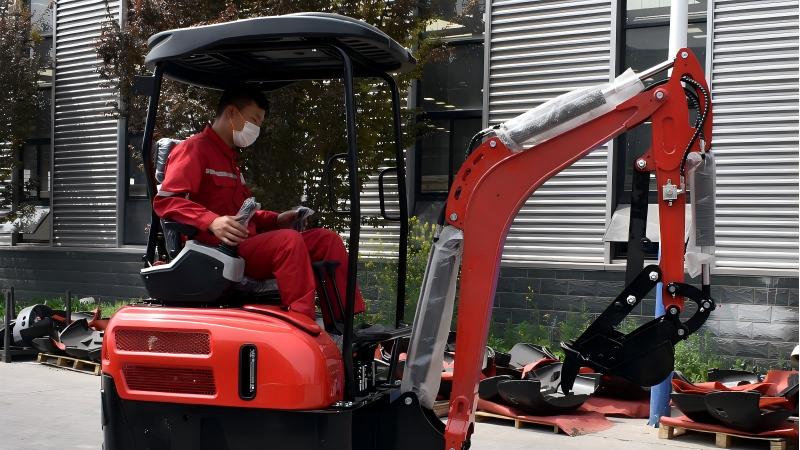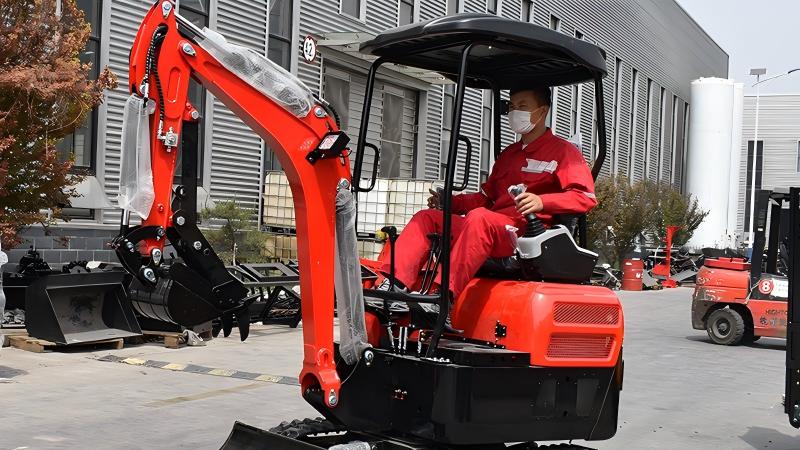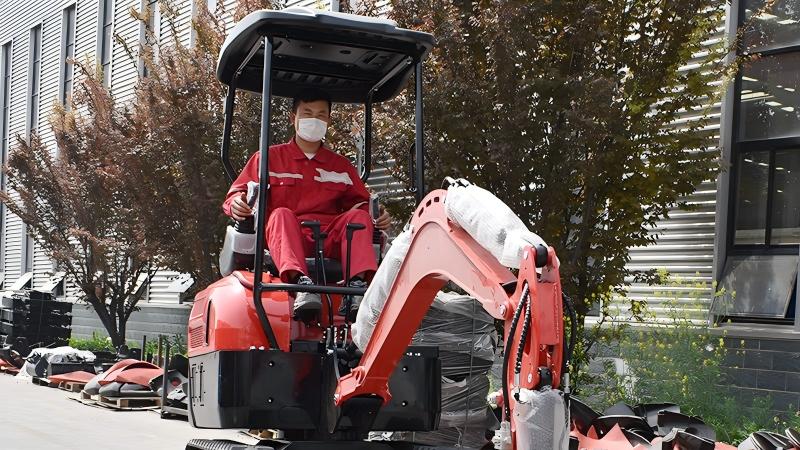Acquiring a mini excavator is a significant investment for any construction, landscaping, or agricultural business, or even for a private homeowner tackling large projects. While new machines offer the latest technology and full warranties, their high cost can be prohibitive. In such cases, purchasing a used mini excavator becomes an attractive alternative, allowing you to get the necessary equipment at a significantly lower price. However, to make a profitable and reliable purchase, it's crucial to know where to look and what to pay attention to.
This article provides a comprehensive overview of places where you can buy a used mini excavator, highlighting the advantages and disadvantages of each option, along with key tips to help you find the right machine.
Specialized Used Equipment Dealers
This is one of the most reliable ways to buy a used mini excavator. Specialized dealers are often official representatives of major manufacturers (such as Kubota, Yanmar, Caterpillar, Hitachi, Komatsu, Bobcat, etc.) or have long-standing partnerships with them.
Advantages:
Verified Quality: Many dealers perform pre-sale preparation, inspecting machines, replacing worn parts, and performing necessary maintenance. Some offer "certified used" equipment that has undergone rigorous inspection and repair to manufacturer standards.
Warranty: Some dealers may provide a limited warranty on used equipment, offering additional peace of mind.
Service History: Dealers often have a complete service history of the machine if they sold it new or serviced it at their center.
Access to Financing and Service: Dealers can offer financing options, as well as ongoing maintenance and repair services for the purchased equipment.
Wide Selection: Large dealers usually have a broad range of models and configurations.
Expert Assistance: Sales consultants possess in-depth knowledge about the equipment and can help you choose a model tailored to your specific needs.
Disadvantages:
Higher Price: Prices at dealerships are typically higher than on the private
market or at auctions, due to the added value of pre-sale preparation, warranty, and service.
Less Price Flexibility: Fewer opportunities for negotiation compared to private sellers.
Online Marketplaces and Classifieds Aggregators
The internet has greatly simplified the search for used equipment. There are many platforms specializing in the sale of construction machinery.
International Platforms:
MachineryTrader.com: One of the largest resources, offering a wide selection of mini excavators from dealers and private sellers worldwide.
Ritchie Bros. Auctioneers (Marketplace-E/IronPlanet): While primarily known for auctions, they also have platforms for direct sales where you can find a wide range of equipment.
Construction Equipment Guide (CEG): Another major platform for buying and selling used equipment.
Mascus.com: An international online marketplace for used machinery.
Regional/Local Platforms (e.g., in Singapore):
Machineryline Singapore: A popular platform for buying/selling specialized equipment in Singapore.
HeavyMart.com (Used Excavators For Sale in Singapore): Another large online marketplace for used heavy machinery in Asia.
Usedequipment.com.sg: A marketplace for used equipment in Singapore.
Plant & Equipment (en-sg): Features ads for excavators for sale in Singapore.
Local classifieds websites: Such as Carousell (though primarily for consumer goods, sometimes smaller specialized equipment can be found), as well as specialized forums and social media groups dedicated to construction equipment in your region.
Advantages:
Huge Selection: Access to thousands of listings from different regions and countries.
Convenient Search: Filters by make, model, year of manufacture, hours worked, price, and location.
Competitive Prices: Opportunity to find very attractive deals, especially from private sellers.
Transparency: Often includes many photos and detailed descriptions.
Disadvantages:
Risk of Buying "a Pig in a Poke": Especially when buying from private individuals or at auctions where there's no pre-sale preparation.
Need for Self-Inspection: It's extremely important to thoroughly inspect the machine or enlist the help of a qualified mechanic.
Logistics: Arranging transportation yourself can be complex and costly, especially when buying from another region or country.
No Warranty: In most cases, used equipment purchased through online classifieds is sold "as is."
Auctions (Physical and Online)
Auctions are a popular way to buy used specialized equipment, including mini excavators. They can be both physical and entirely online.
Major Auction Houses:
Ritchie Bros. Auctioneers: One of the largest global auction houses, regularly holding sales of specialized equipment.
IronPlanet: An online auction specializing in heavy equipment, now part of Ritchie Bros.
GovPlanet: Auctions of government and military equipment, where civilian machinery can sometimes be found.
Local Auction Houses: Some regions host local auctions for agricultural and construction equipment.
Advantages:
Potential for Low Prices: At auctions, you can buy equipment at a significantly lower price than the market value if you're lucky and competition is low.
Quick Transaction: The purchase process at an auction is usually fast.
Large Volume of Equipment: Often many units of equipment are put up for sale at once, providing a wide selection.
Disadvantages:
"As Is" Purchase: Equipment is sold without warranties, and usually there's no opportunity for a deep inspection before bidding.
High Risk: Requires deep market and technical knowledge to avoid buying a problematic machine.
Additional Fees: Auction fees, taxes, and commissions are added to the final hammer price.
Time Pressure: Decisions must be made quickly, which can lead to impulsive purchases.
Transportation: The buyer is responsible for hauling the equipment away. Direct Purchase from Companies or Private Individuals
Some companies regularly update their equipment fleet and sell older machines directly. The same applies to private individuals who have completed a project.
Advantages:
Potentially Good Prices: You can often negotiate a better price since there are no intermediaries.
Known History: If you're lucky, you can get detailed information about the operation and maintenance history directly from the owner.
Opportunity for a Test Drive: It's often possible to arrange a full inspection and test run.
Disadvantages:
Limited Selection: You're dependent on what's currently available.
No Warranty: Sales are typically "as is."
May Require Self-Inspection: Always enlist an independent mechanic.
Documentation Issues: Make sure all paperwork is in order
Tips for Buying a Used Mini Excavator
Regardless of where you decide to buy, the following tips will help you make the right choice:
Define Your Needs: What kind of work do you plan to do? What lifting capacity, digging depth, and dump height do you need? Will the excavator operate in confined spaces?
Set a Budget: Consider not only the purchase price but also potential costs for transportation, repairs, maintenance, and attachments.
Research the Market: Compare prices for similar models from different brands and years.
Check the Hour Meter: Hours worked (operating hours) are a more important indicator of wear than the year of manufacture. Low hours for an older machine might indicate long periods of idleness or improper storage, while very high hours for a newer one suggest intensive use.
Inspect the Equipment in Person:
Engine: Check for oil or coolant leaks, unusual noises during operation. Look at the exhaust: blue smoke indicates oil burning, black indicates fuel system issues.
Hydraulics: Check hoses for wear, cracks, and leaks. Ensure all hydraulic functions operate smoothly and without delay.
Undercarriage: For track excavators, check the condition of the tracks, rollers, and sprockets. Wear on these components can be very expensive to replace.
Boom and Bucket: Look for cracks, welds (may indicate serious repairs after damage), and wear on pins and bushings (play).
Operator Cab: Check the condition of the seat, gauges, and controls. Make sure everything works.
Overall Appearance: Rust, fresh paint (can hide defects), signs of impact.
Request Service History: If possible, obtain records of regular maintenance and repairs.
Conduct a Test Drive: Start the engine, test all functions: digging, swinging the boom, moving. Listen for any unusual noises.
Hire an Independent Mechanic: This is perhaps the most important tip. An experienced mechanic specializing in construction equipment can identify hidden problems that a layman might miss.
Conclusion
Buying a used mini excavator is an excellent way to save money and acquire the necessary equipment. However, this process requires careful preparation, attention to detail, and, ideally, professional assistance. Whether it's a specialized dealer, an online platform, or an auction, each option has its peculiarities. By understanding these features and following equipment inspection recommendations, you'll significantly increase your chances of acquiring a reliable and efficient mini excavator that will serve you for years to come.
Post time:Sep-25-2020



